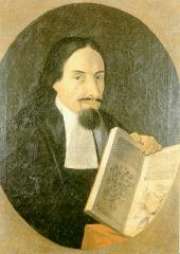|
Biography Cecco Angiolieri
(1260 cca - 1313 cca)
Născut la Siena din părinți bogați, bigoți și avari cu fiul lor, Cecco moare lăsând în urmă nenumărate datorii și amintirea unei vieți extravagante, trândăvie și desfrâu. Poet original și bizar, este autorul unui Canțonier de 110 sonete cu atribuire certă, jurnal de o sinceritate brutală al vieții lui familiale și citadine.
***
Cecco Angiolieri was born in Siena in 1260, son of Angioliero, who was himself the son of Angioliero Solàfica who was for several years a banker to Pope Gregory IX; his mother was Lisa de' Salimbeni, from a powerful Senese family.
In 1281 he was with the Guelphs of Siena who were besieging their Ghibelline fellow citizens in the Torri di Maremma, near Roccastrada, Tuscany, and he was fined many times for deserting the battlefield without permission. He was fined again on July 11, 1282, for violating the curfew of Siena, signalled by the third ringing of the commune bells. He was slapped with another fine in 1291 in similar circumstances.
He fought with the Florentines against Arezzo in 1288 and it is possible that this was where he met Dante. His Sonnet 100, dated between 1289 and 1294 seems to confirm that the two knew each other, since Cecco refers to a person (a mariscalco) whom they both knew personally ("Lassar vo' lo trovare di Becchina, / Dante Alighieri, e dir del 'mariscalco'"). Around 1296 he left Siena to go into exile for political reasons. We can deduce from Sonnet 102 (from 1302-1303), addressed to Dante who was already in Verona, that during this period, Cecco was in Rome ("s'eo fatto romano, e tu lombardo"). We do not know whether his exile from Siena from 1296 to 1303 was interrupted. The sonnet also shows a definitive break between Cecco and Dante ("Dante Alighier, i' t'averò a stancare / ch'eo so lo pungiglion, e tu se' 'l bue" - "Dante boy, I'll simply wear you out: / since I'm the cattle-prod that drives your ox." [1]). Unfortunately most of the poetic material relating to Dante has been lost: their poetic dispute, as well as their possible earlier relationship which then deteriorated.
In 1302 Cecco had to sell off his vineyard to one Neri Perini del Popolo di Sant'Andrea for seven-hundred lire, and this is the last information that is available from Angiolieri's lifetime.
From a later document (February 25, 1313) we know that five of his children (Meo, Deo, Angioliero, Arbolina and Sinione- another daughter, Tessa, had already left the household) renounced their inheritance because the estate was too far in debt. It is therefore possible to assume that Cecco Angiolieri died in Siena around 1310, perhaps between 1312 and the beginning of 1313.
|





